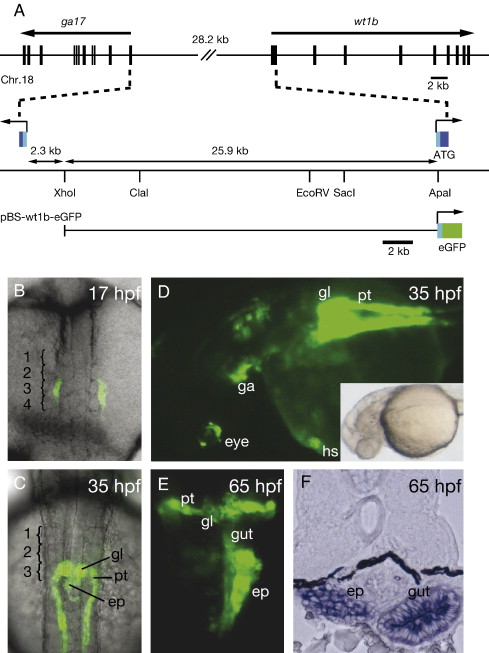Fig. 2 Generation and characterization of a transgenic zebrafish line with pronephros-specific GFP expression. (A) Structure of the wt1b genomic region and the reporter construct. The upper panel shows the wt1b gene (9 exons) and the ga17 gene (11 exons) lying on chromosome 18. 5′ to 3′ orientation of both genes is indicated. Exons are represented by black boxes. The middle panel shows a restriction map of the region between ga17 and wt1b including the first exon of both genes. Untranslated regions are shown in light blue and coding regions in dark blue. Lower panel shows a schematic diagram of the construct used to generate transgenic fish. This construct contains an XhoI/ApaI genomic fragment fused to eGFP. (B, C) Overlays of transmission (gray) and fluorescence (green) dorsal images of 17 hpf (B) and 35 hpf (C) embryos, respectively. First four somites in panel B and first three somites in panel C are numbered and marked by parentheses; gl, glomerulus; pt, pronephric tubule; ep, exocrine pancreas. (D, E) Dorsolateral (D) and dorsal (E) fluorescence images of 35 hpf (D) and 65 hpf (E) embryos, respectively. The inset in panel D shows a bright-field image to illustrate the orientation of the embryo. Note that the image in panel D is overexposed with regard to the pronephros in order to display the weaker GFP expression in the eye, gill arches (ga) and the heart sac (hs). (F) A cross-section of a 65-hpf embryo through the middle of the yolk region is shown that has been hybridized with a ga17 riboprobe.
Reprinted from Developmental Biology, 309(1), Perner, B., Englert, C., and Bollig, F., The Wilms tumor genes wt1a and wt1b control different steps during formation of the zebrafish pronephros, 87-96, Copyright (2007) with permission from Elsevier. Full text @ Dev. Biol.

